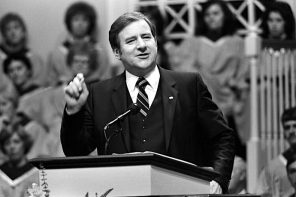In a must-read op-ed at the LA Times Diane Winston reminds us that reporting on poll results is not just a matter of reciting statistics.
Just because voters in 2012 claim to be more interested in Romney’s taxes than his relationship with Jesus doesn’t mean religion is any less important. Winston reminds us that at this point it’s not religion in and of itself, but conservative social values, that bind together the seemingly disparate elements of the religious right coalition. And how did this happen, again?
When he founded the Moral Majority more than 30 years ago, Jerry Falwell hoped to unite white evangelicals, Roman Catholics and Orthodox Jews around all these positions. But he began by focusing more narrowly on social issues, citing all three religions’ shared antipathy for “abortion on demand,” gay rights and other alleged threats to the nuclear family. His bold vision defied the long-standing mutual distrust among religions, and it was not clear in the beginning whether the approach could succeed. Could anti-Semitism and anti-Catholicism be put aside? Could evangelical soul-saving take a back seat to disciplined vote-getting? Could a joint crusade to save “unborn life” trump decades of mutual suspicion?
As it turned out, the answer to those questions was yes.
So yes, the Moral Majority couldn’t have come together without a big interfaith effort. Pluralism, cooperation, and scapegoating. It just works.




